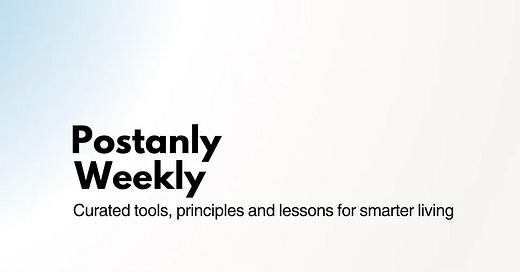50 habits of lifelong learners, the best advice from 50 therapists and more
3 New ideas on better living
Hello everyone,
Welcome to the Weekend Reads.
Postanly Weekly is now a reader-supported self-improvement newsletter. To maximise impact, all issues in the future will be FREE. To support my work, you can upgrade to a paid subscription for $6 per month or $40 for an entire year. If you are already a paid subscriber, thank you. If you’ve ever paid for any of my digital products, thank you. I appreciate you all (free or paid) for your attention and time. Bonus content for paid supporters: an invite to Thinking Toolbox (mental models for life) and Mental Wealth Toolbox (practical concepts for smarter decisions). All courses and books at Perennial Learner.
In partnership with Meco
Read all your awesome newsletters on a single app. Meco is a distraction-free space for reading and discovering newsletters, separate from the inbox. Add your newsletters in seconds and liberate your inbox. Move your newsletters to a space built for reading and declutter your inbox in seconds. Enjoy newsletters in a space designed for reading. Learn More
50 habits of lifelong learners
Helen Keller, Einstein, Confucius, da Vinci, Richard Feynman and many of history’s geniuses were self-learners. They never settled but were committed to personal growth and knowledge discovery.
Lifelong learning means different things to different people, but it often means being willing to explore new things or improve your skills and knowledge. When learning is fun, you are likely to enjoy the process.
“Learning never exhausts the mind,” Leonardo da Vinci said.
Lifelong learning is essential for personal growth and reinvention. It’s not something we do for a few years and then quit. It’s a habit that needs to be cultivated throughout our lives.
While every person’s journey to success as a lifelong learner is different, the common denominator for all of us is in the habits we need to adopt if we want to succeed as lifelong learners. Some of these habits can help you become a successful lifelong learner.There’s no right or wrong; do more of what works for you.
Lifelong learners are high-volume readers. They love to get lost in great books that challenge their perspective and upgrade their minds.
They learn from other smart minds — almost every experience with people smarter than you is an opportunity to learn something new.
“To develop a complete mind: Study the science of art; Study the art of science. Learn how to see. Realize that everything connects to everything else.” — da Vinci
Self-leaners use almost every opportunity to pick up new knowledge, practice their craft, or revisit great content.
“Knowledge is exploding, so you need to commit yourself to a plan for lifelong learning.” — Don Tapscott
They nurture their intellectual curiosities. A deeper understanding of the things you care about can help you connect ideas better.
Lifelong learners are not afraid of change; they know extraordinary results can only be achieved if you keep an open mind.
They are always experimenting. Practice is how you discover smart ways to do things or make real progress.
All life is an experiment. The more experiments you make the better. — Ralph Waldo Emerson
Lifelong learners love making progress; they learn a lot from the process of getting things done. Make progress your priority; don’t obsess about goals.
They engage the brain to keep it active. The mind is not a vessel to be filled but a fire to be kindled. — Plutarch
“The most important skill for getting rich is becoming a perpetual learner. You have to know how to learn anything you want to learn. — Naval
Smart learners ask better questions. To keep digging, ask open-ended questions that can help you understand topics better. “To ask the right question is harder than to answer it.”— Georg Cantor
Lifelong learners are not afraid to be wrong. They are aware of the illusion of knowledge. They question their assumptions and beliefs to find better knowledge.
Every life experience is a learning opportunity for lifelong learners. “Always walk through life as if you have something new to learn and you will.” — Vernon Howard
Lifelong learners choose careers that encourage them to pursue their curiosities. Your love for knowledge will die if you lean against the wrong wall.
They don’t allow their work to interfere with their personal growth. Work doesn’t define you. You are not your work. Make time for self-growth.
Self-learners embrace activities, hobbies and knowledge that challenge their minds. New things boost brain activity; use them to expand your worldview.
“The purpose of learning isn’t to affirm our beliefs; it’s to evolve our beliefs.” — Adam Grant
They teach what they learn. Lifelong learners remember more of what they learn because they also teach and share what they know.
Lifelong learners don’t think mistakes are to be avoided. They learn more from their failures than successes. If you learn from defeat, you haven’t really lost. — Zig Ziglar
They don’t make up their minds in haste — they rationalise, analyse, question their answers, and look for better ways to improve their reasoning.
Lifelong learners are doers. They find things out for themselves. You can only truly learn when you practice what you know. “The doer alone learneth.” — Friedrich Nietzsche
They learn from multiple sources; books, relationships, conversations, experience, mentors and even their enemies.
Comfort is the enemy. Smart learners are constantly in the business of challenging their habits and way of life and always aim to push past their safe zones.
They listen more than they speak. Wisdom is slow to show off. You learn more by learning to listen actively. When in doubt, listen.
Lifelong learners are not afraid to unlearn to relearn. Beware of false knowledge. What you know could be holding you back. Learning to learn is a valuable skill in the modern world.
If you really want to earn and build wealth, learn to become a lifelong learner. The key to wealth is hidden in the books you are not reading. “The more you learn, the more you earn.” — Warren Buffett
You become wise by learning to keep your mind young. Lifelong learning is the only way to stay young. “Anyone who stops learning is old, whether at twenty or eighty.” — Henry Ford
They aim to become wiser today than they were yesterday. Successful learners make knowledge acquisition a daily habit. They go to bed wiser than they were the day before.
Successful learners don’t allow their beliefs to get in the way of learning when they find new or better knowledge. Beware of the curse of existing beliefs and assumptions.
As long as they live, lifelong learners keep learning how to live. “As long as you live, keep learning how to live.” — Seneca
Lifelong learners are also great thinkers. They reflect, ponder and make time to process what they are learning. Learning won’t get you anywhere without thinking.
They value breaks as much as they value learning. You retain more of what you learn when you make time for brain breaks. The brain connects ideas better when it’s calm and at rest.
Super learners maintain to-learn lists. Learn to write down anything you want to pursue in the future. The to-learn list is a blueprint for your learning journey.
They start learning with the end in mind. Learning is lifelong but ask yourself: what do I want to achieve? Why am I on this path?
Lifelong learners are not afraid to quit. When the journey is no longer interesting, when the book is no longer valuable, give yourself permission to quit and move on.
They use many content types to boost retention; don’t just read books, listen to podcasts or audiobooks, watch documentaries, read newsletters, learn from mentors, courses and events.
They pursue personal projects. Lifelong learners use creative projects to practice what they learn. It’s a better way to gain experience.
Their long term goal is personal satisfaction. The bigger goal of learning can help you lead a meaningful and fulfilling life.
They make it a self-discovery process. Lifelong learning can help you find your strengths, weaknesses and unique skills faster.
Lifelong learners are self-aware. They gain a better understanding of themselves through learning. “The more I read, the more I acquire, the more certain I am that I know nothing.” — Voltaire
Lifelong learners use the opportunity to learn to find better career paths. Einstein discovered career and world-changing ideas whilst working at a patent office.
They balance learning and working. Super learners find better ways to manage their time without sabotaging their careers.
Successful learners know that they know nothing. It’s the foundation of learning. As Socrates once said, “I know one thing: that I know nothing.”
They adopt the scientific method. They act like there’s more to discover and explore in any field of endeavour.
Lifelong learners don’t think of life experiences as a waste of time. “Nothing is a waste of time if you use the experience wisely.” — Auguste Rodin
Super learners are apprentices at heart. They embrace the beginner’s mindset to learn more from people who have come before them. Both Leonardo da Vinci and Michelangelo were apprentices at the beginning of their careers.
They almost always learn more than they probably should. Their curiosities drive them to go deeper into topics. Warren Buffett reads 80% of the time, practically every day.
Over the long term, lifelong learners learn more from unstructured learning than from formal education. School gets you started; self-learning keeps you going.
Recommended Reads
‘My life will be short. So on the days I can, I really live’: 30 dying people explain what really matters [The Guardian] — I always thought, “I’ll get my career sorted, then we’ll get married, have children, go travelling.” And then cancer happened. You grieve for your future self. Your imagined children and your career. If I died tomorrow…
Rest Takes Hard Work [Time] — Whether it's breaks during the day, hobbies that take our mind off work, weekly sabbaths or annual vacations, routines that layer periods of work and rest help us be more productive, have more sustainable careers, and enjoy richer and more meaningful lives.
Feeling ragey? Don't bury your anger, process it. Here's how [NPR] — While anger is common, many of us have a conflicted relationship with it. So often we're told that expressing our outrage makes us a "hothead" or means we have "issues." In other words, we're taught to feel bad about our anger.
The Best Advice from Therapists, From 50 Different People [Pocket] — “We feel like the world is happening TO us. We don’t realize that we can still find peace and happiness in chaos. Finding that place means having a connection within. It’s been absolutely life altering to take this power back.”
Our innate ideas prevent us seeing what is innate in human nature [Psyche] — To be sure, people do not uniformly deny all forms of innateness. When asked to intuit about the origins of emotions, people assert that infants are born preferring happy faces to angry ones, and they believe that the physical expressions of emotions…
How to Live on 24 Hours a Day: Arnold Bennett on Living a Meaningful Life Within the Constraints of Time — The supply of time is truly a daily miracle. You wake up in the morning and lo! your purse is magically filled with 24 hours of the unmanufactured tissue of the universe of your life! It is yours.
3 ideas on better living
Book summaries I recommend — Derek Sivers Book Notes: Derek has summarised over 200 of the best books on wealth, health, productivity and happiness. It’s an insightful collection.
A podcast I recommend — Deep Questions with Cal Newport, the New York Times bestselling author of Digital Minimalism and Deep Work. In this podcast, he answers questions from his readers about work, technology, and the deep life.
A quote I’m pondering — "Live with a bias toward action. Ironically, this will teach you patience. When you take action each day, you learn the value of accumulating small improvements over time. You understand how daily habits compound. Be impatient with your actions. Be patient with your results." —James Clear
A newsletter I recommend
Morning Brew covers the latest news across business, finance, and tech in the most digestible way to save you time. The teams condenses the day's most important stories into a short, quick, and entertaining read. It’s read by over 4 million professionals. I read it every day. Try it, it’s free.
Classified:
Aimply Briefs: The Last Newsletter You'll Need. Using a combination of humans and AI, we deliver a curated brief containing all the most relevant stories to you every weekday.
Get featured here.
Thanks for reading!
Until next week,
Thomas
Medium | Thinking Toolbox | The Write Life | How to Live: Lessons in Stoicism
Postanly Weekly is now a reader-supported publication. To support my work, you can upgrade to a paid subscription for $6 per month or $40 for an entire year.





